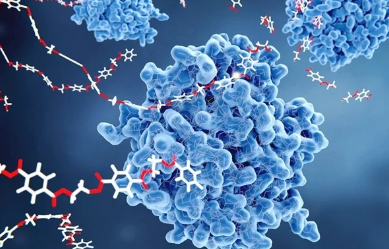What are Nanozymes?
Recent research focuses on artificial enzymes known as nanozymes, which show promise in creating advanced materials for medicine. Scientists aim to understand how nanozymes interact with proteins, goal is to develop nanozymes that are precise and efficient.
About Nanozymes
Nanozymes are synthetic enzymes that mimic natural enzyme functions, which can interact with small molecules but their role with larger proteins is less understood. Research is now expanding to include structural proteins, such as collagen.
Research at CSIR-CLRI
A team at the CSIR-Central Leather Research Institute investigated nanozymes’ interaction with collagen. Led by Dr. Amit Vernekar, the team used a manganese-based oxidase nanozyme (MnN). They demonstrated that MnN could crosslink collagen molecules effectively.
Crosslinking Process
Crosslinking involves linking collagen molecules together. The researchers used tannic acid under mild conditions. This method preserved the natural structure of collagen. It enhanced collagen’s stability, making it resistant to degradation by collagenase.
Artificial Enzyme Design
In another study, researchers embedded an active site in a material called MOF-808. This design mimics natural enzymes’ binding pockets. It improved control over chemical reactions. However, challenges arose with larger proteins like cytochrome c.
Balancing Reactivity
The study marks the need to balance desired and unwanted reactivity. This is crucial when designing artificial enzymes for medical applications. Careful design ensures selectivity and efficiency in enzyme interactions.
Expanding Applications
The research broadens nanozymes’ applications beyond small molecules. It paves the way for developing biomaterials with intact structural properties. Such advancements are essential for therapeutic uses and enhancing material durability.
The team’s work reveals how nanozymes can interact with structural proteins. It emphasizes the importance of careful design in creating artificial enzymes. These findings contribute to the fields of biotechnology and medicine.
Important Facts for Exams:
- CSIR-CLRI: The CSIR-Central Leather Research Institute is a premier research institute in India. It focuses on leather technology and biomaterials, contributing to advancements in biomedical applications.
- Manganese-based oxidase nanozyme (MnN): MnN is a synthetic enzyme that facilitates collagen crosslinking. It enhances collagen stability and resistance to degradation, offering potential for durable biomaterials in medical applications.
- MOF-808: MOF-808 is a metal-organic framework used in enzyme design. It mimics natural enzyme binding sites, improving reaction control but facing challenges with larger proteins like cytochrome c.
Month: Current Affairs - November, 2024
Category: Science & Technology Current Affairs


